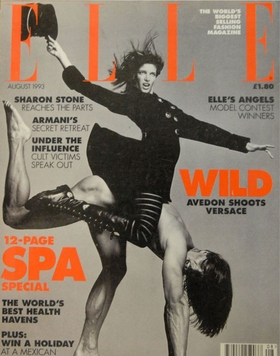Related Research Articles

David Ernest McReynolds was an American politician and social activist who was a prominent democratic socialist and pacifist activist. He described himself as "a peace movement bureaucrat" during his 40-year career with the War Resisters League. He was a resident of New York City. McReynolds was twice a candidate for President of the United States, running atop the ticket of the Socialist Party USA in 1980 and 2000. He was America's first openly gay presidential candidate.

A number of peace symbols have been used many ways in various cultures and contexts. The dove and olive branch was used symbolically by early Christians and then eventually became a secular peace symbol, popularized by a Dove lithograph by Pablo Picasso after World War II. In the 1950s the "peace sign", as it is known today, was designed by Gerald Holtom as the logo for the British Campaign for Nuclear Disarmament (CND), a group at the forefront of the peace movement in the UK, and adopted by anti-war and counterculture activists in the US and elsewhere. The symbol is a superposition of the semaphore signals for the letters "N" and "D", taken to stand for "nuclear disarmament", while simultaneously acting as a reference to Goya's The Third of May 1808 (1814).

The Nuclear Disarmament Party (NDP) was an Australian political party formed in June 1984. It was founded by medical researcher Michael Denborough as the political arm of the Australian anti-nuclear movement, which had been active since the early 1970s.

Bruce Kent was a British Roman Catholic priest who became a political activist in the Campaign for Nuclear Disarmament, and held various leadership positions in the organisation.
Douglas James Roche, OC, KCSG is a Canadian author, parliamentarian, diplomat and peace activist. Roche served as Progressive Conservative Member of Parliament (MP) for Edmonton—Strathcona from 1972 to 1979 and for Edmonton South 1979–1984. In 1984, he was appointed Canada's Ambassador for Disarmament, a position he held until 1989. He was appointed to the Senate of Canada on September 17, 1998, where he served until June 13, 2004. Currently he resides in Edmonton, Alberta.

Peace camps are a form of physical protest camp that is focused on anti-war and anti-nuclear activity. They are set up outside military bases by members of the peace movement who oppose either the existence of the military bases themselves, the armaments held there, or the politics of those who control the bases. They began in the 1920s and became prominent in 1982 due to the worldwide publicity generated by the Greenham Common Women's Peace Camp. They were particularly a phenomenon of the United Kingdom in the 1980s where they were associated with sentiment against American imperialism but Peace Camps have existed at other times and places since the 1920s.

The World Peace Council (WPC) is an international organization with the stated goals of advocating for universal disarmament, sovereignty and independence and peaceful co-existence, and campaigns against imperialism, weapons of mass destruction and all forms of discrimination. Founded from an initiative of the Information Bureau of the Communist and Workers' Parties, WPC emerged from the bureau's worldview that divided humanity into Soviet-led "peace-loving" progressive forces and US-led "warmongering" capitalist countries. Throughout the Cold War, WPC operated as a front organization as it was controlled and largely funded by the Soviet Union, and refrained from criticizing or even defended the Soviet Union's involvement in numerous conflicts. These factors led to the decline of its influence over the peace movement in non-Communist countries. Its first president was the French physicist and activist Frédéric Joliot-Curie. It was based in Helsinki, Finland from 1968 to 1999, and since in Athens, Greece.
European Nuclear Disarmament (END) was a Europe-wide movement for a "nuclear-free Europe from Poland to Portugal” that put on annual European Nuclear Disarmament conventions from 1982 to 1991.

Peace News (PN) is a pacifist magazine first published on 6 June 1936 to serve the peace movement in the United Kingdom. From later in 1936 to April 1961 it was the official paper of the Peace Pledge Union (PPU), and from 1990 to 2004 was co-published with War Resisters' International.

Pax Christi International is an international Catholic peace movement. The Pax Christi International website declares its mission is "to transform a world shaken by violence, terrorism, deepening inequalities, and global insecurity."
The Link is an independent, student-run, not-for-profit multi-media publication at Concordia University. The Link publishes a monthly magazine on the first Tuesday of each month during the fall and winter semesters, and publishes online daily through its website.

The International Peace Bureau, founded in 1891, is one of the world's oldest international peace federations. The organisation was awarded the Nobel Peace Prize in 1910 for acting "as a link between the peace societies of the various countries". In 1913, Henri La Fontaine was also awarded the Prize "[For his work as] head of the International Peace Bureau". As of 2012, eleven other Nobel Peace Prize laureates have been members of the IPB.

Tokuma Shoten Publishing Co., Ltd. is a publisher in Japan, headquartered in Shinagawa, Tokyo. The company was established in 1954 by Yasuyoshi Tokuma in Minato, Tokyo. The company’s product portfolio includes music publishing, video game publishing, movies, anime, magazines, manga and books.
Dr. Randall Caroline Forsberg led a lifetime of research and advocacy on ways to reduce the risk of war, minimize the burden of military spending, and promote democratic institutions. Her career started at the Stockholm International Peace Research Institute in 1968. In 1974 she moved to Cambridge, Massachusetts to found the Institute for Defense and Disarmament Studies (IDDS) as well as to launch the national Nuclear Weapons Freeze Campaign. Randall Forsberg was accompanied by an important colleague by the name of Helen Caldicott while she was leading the Nuclear freeze movement in both Manhattan and Central Park. Both women were met with many challenges in their efforts to lead the Nuclear Freeze Movement. These challenges included gender discrimination and discreditation as influential leaders by the media. Forsberg's strong leadership in the nuclear freeze movement is thought to be very influential in the writing of foreign policy during the Reagan administration and is even credited with catalyzing the negotiation of the INF treaty between President Reagan and Mikhail Gorbachev.

Elle is a worldwide women's magazine of French origin that offers a mix of fashion and beauty content, together with culture, society and lifestyle. The title means "she" or "her" in French. Elle is considered one of the world's largest fashion magazines, with 45 editions around the world and 46 local websites. It now counts 21 million readers and 100 million unique visitors per month, with an audience of mostly women. It was founded in Paris in 1945 by Hélène Gordon-Lazareff and her husband, the writer Pierre Lazareff. The magazine's readership has continuously grown since its founding, increasing to 800,000 across France by the 1960s. Elle editions have since multiplied, creating a global network of publications and readers. Elle's Japanese publication was launched in 1969, beginning an international expansion. Its first issues in English were launched in 1985. Both Elle and Vogue share similar goals to showcase the newest fashion yet Its main audiences are younger people compared to Vogue.
PeaceWomen Across the Globe (PWAG), previously known as 1000 PeaceWomen, is an organization based in Bern, Switzerland that aims to increase the visibility of women promoting peace all over the world.
Metta Spencer is a Canadian sociologist, writer, peace researcher, and activist.

The Campaign for Nuclear Disarmament (CND) is an organisation that advocates unilateral nuclear disarmament by the United Kingdom, international nuclear disarmament and tighter international arms regulation through agreements such as the Nuclear Non-Proliferation Treaty. It opposes military action that may result in the use of nuclear, chemical or biological weapons and the building of nuclear power stations in the UK.

Kodansha Ltd. is a Japanese privately-held publishing company headquartered in Bunkyō, Tokyo. Kodansha publishes the manga magazines Nakayoshi, Afternoon, Evening, Weekly Shōnen Magazine and Bessatsu Shōnen Magazine, as well as the more literary magazines Gunzō, Shūkan Gendai, and the Japanese dictionary Nihongo Daijiten. Kodansha was founded by Seiji Noma in 1910, and members of his family continue as its owners either directly or through the Noma Cultural Foundation.
Nuclear Times was a magazine devoted to nuclear disarmament that was published from 1982 to 1992. "Devoted to education between and communication among peace activists," contributors to the magazine included "journalists, scholars, and activists." The magazine was noted for its practice of listing "organizational resources keyed to each issue's articles." Nuclear Times was characterized by The New York Times as "the peace movement's most popular magazine."
References
- ↑ Peace Magazine homepage, Retrieved 22 July 2011.
- ↑ Peace Magazine website, "About Peace Magazine", Retrieved 22 July 2011.